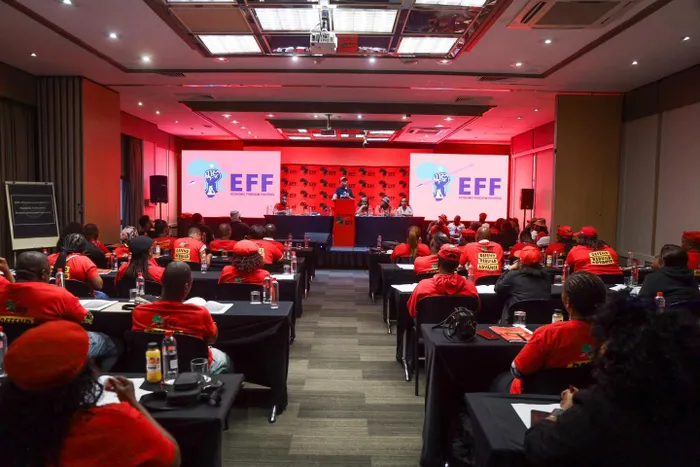
The EFF wanted to stop Finance Minister Enoch Godongwana's decision to hike petrol levies by 16 cents per litre and diesel by 15 cents per litre in the third iteration of the National Budget presented in May.
Image: Faceboook/EFF
The Economic Freedom Fighters (EFF) have been handed a crushing legal defeat and a hefty bill after their desperate last-minute attempt to block fuel levy increases spectacularly collapsed in the Western Cape High Court.
In a recently published judgment, Acting Judge Mayosi stated that the red berets had taken a "haphazard approach" to litigation in what the ruling said has become an all-too-familiar pattern.
“It is hard to resist the conclusion that this manner of litigating, with the prejudices and unfairness inherent in it both for the opponents involved and other litigants in the division, and the judges hearing those matters, has become a pattern for the EFF.”
The EFF wanted to stop Finance Minister Enoch Godongwana's decision to hike petrol levies by 16 cents per litre and diesel by 15 cents per litre in the third iteration of the National Budget presented in May.
These increases took effect on June 4, 2025.
However, motorists got some relief that month with petrol prices actually dropping by 5 cents per litre and diesel falling by 37 cents per litre, meaning the fuel levy increase was partially offset by other market factors.
But the court identified three "fatal flaws" that sank the EFF’s bid for an urgent application before it even got off the ground.
The most damning criticism came around the EFF's timing. The party only acted five days after Godongwana delivered his budget speech on May 21.
It sent a series of demand letters – three attempts in one evening – that had to be repeatedly corrected for "technical and computational material errors."
"The extreme urgency with which the EFF brought this application was entirely self-created and unwarranted," Judge Mayosi declared, pointing out the "inconvenience to the court, and unfairness and potential prejudice" caused by their chaotic approach.
The court revealed how the EFF's unreasonable timelines forced judges to postpone other matters, including a running criminal case, just to accommodate their supposedly urgent application. Judges even had to remain on standby over the weekend, "constantly on the look-out for papers which never came as per the EFF's set deadlines."
The court identified three legal flaws:
First, the party failed to provide any review grounds in their founding papers – a basic requirement after the Constitutional Court's ruling in a previous EFF case.
"The founding affidavit contains no review grounds at all," the judge noted, making it impossible for the court to assess their chances of success.
Second, they couldn't prove they had a basic legal right to the relief they wanted.
Third, and most critically, the EFF's entire legal argument revolved around its argument that a Bill should have been introduced to amend the fuel levy.
“In this regard, the basic premise of the EFF’s application is fatally defective,” said the ruling.
The court found that the Minister was perfectly entitled to increase fuel levies using existing powers under the Customs and Excise Act – the same mechanism that's been used seven times over the past decade while the EFF sat in Parliament without objection.
The Constitutional Court had previously confirmed that such ministerial powers are subject to proper parliamentary oversight through built-in safeguards.
The EFF now faces a substantial costs bill, ordered to pay the Minister's legal fees on Scale B – including the costs of two counsel where employed.
Scale B allows legal fees of up to R3,000 per hour or R30,000 per day, typically reserved for more complex matters.
Given the involvement of senior legal teams in a 75-page answering affidavit, this could easily run into hundreds of thousands of rand.
IOL